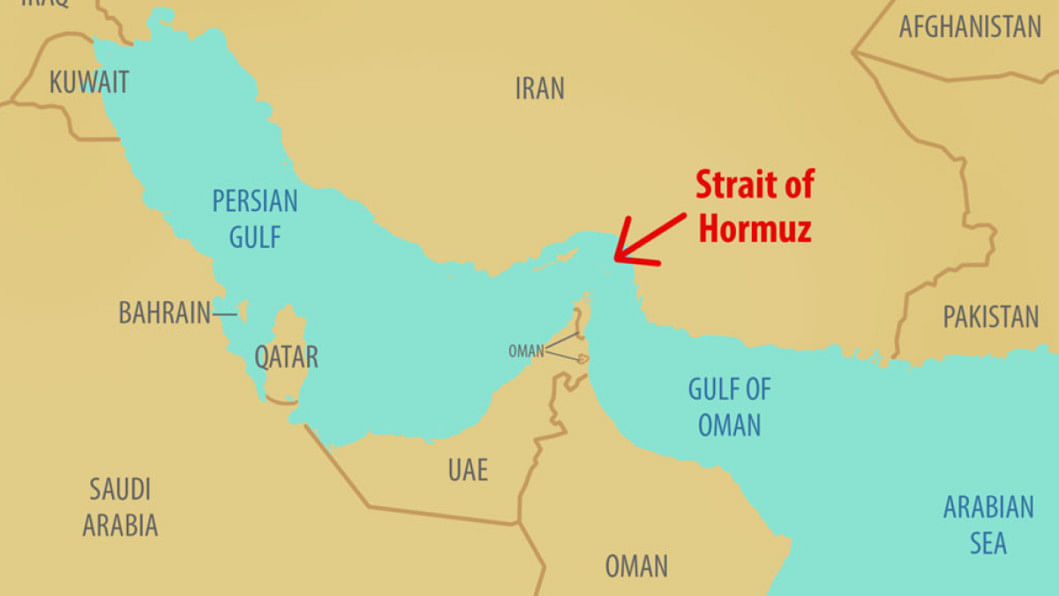Iran-Israel conflict raises concern over Bangladesh’s fuel imports

Bangladesh is likely to face disruptions in fuel imports, as the ongoing Iran-Israel conflict may affect the routes through which the energy-supplying nations move their ships.
Bangladesh's fuel imports rely on the use of the Strait of Hormuz, the only maritime passage into the Persian Gulf and through which about 20 percent of the world's oil exports pass.
Most Asian nations, including Bangladesh, depend on Middle Eastern countries for their fuel needs and the majority of these energy-rich countries such as Saudi Arabia, Kuwait, Qatar, Bahrain, the UAE, Iraq, and Oman transport fuel through the strait.
An escalation in the conflict could affect this critical route, and Iran has already threatened to shut down the strait if Israel does not halt its attacks, industry experts said.
Any such closure would severely disrupt fuel transport, as Iran lies on one side of the strait, with Oman and the UAE on the other.
China, India, Vietnam, Singapore, Indonesia, and Malaysia—the major sources of refined oil for Bangladesh—mainly import crude oil from these Middle Eastern nations.
Officials from several shipping companies involved in fuel transport mentioned that the Bangladesh Petroleum Corporation (BPC) imports crude oil from Saudi Arabia and Abu Dhabi, while Petrobangla imports liquefied natural gas (LNG) from Qatar.
Moreover, Bangladeshi private gas companies also import liquefied petroleum gas (LPG) from Iraq and Oman.
If Iran's threat materialises and the Strait of Hormuz is blocked, there will be no viable alternative routes for transporting oil from Saudi Arabia and Qatar.
However, crude oil loaded at Abu Dhabi's Jebel Dhanna Port can be diverted via Fujairah Port, bypassing the Strait, but this would significantly increase freight costs, the officials added.
Shipping officials also noted that large vessels—typically with a capacity of 200,000 tonnes—operate through Fujairah.
Bangladesh usually imports crude oil using vessels with 120,000-tonne capacity, and smaller ships face loading difficulties at Fujairah. Hiring larger vessels also increases costs.
In the 2023-24 fiscal year, Bangladesh imported 67 lakh tonnes of fuel, including 15 lakh tonnes of crude oil from Saudi Arabia and Abu Dhabi and 52 lakh tonnes of refined fuel from various Asian countries, according to BPC data.
Crude oil is typically loaded from Saudi Arabia's Ras Tanura Port and the UAE's Jebel Dhanna and Fujairah Ports, while LNG is shipped from Qatar's Ras Laffan Port.
"All fuel products used in Bangladesh are imported from the Middle East," Abdul Mannan Patwary, director for planning at Petrobangla, told The Daily Star.
"If the Iran-Israel conflict intensifies, it will definitely have negative impacts. Our fuel import costs will increase."
Former senior BPC officials, requesting anonymity, told The Daily Star that although the conflict has not fully escalated into a war, global fuel prices are already rising.
Iran's Tehran Refinery—one of the largest in the world, with a capacity of 225,000 barrels per day—was struck by Israeli missiles on June 13.
Following the attack, global oil prices jumped nearly 9 percent.
The upward trend in global oil prices could put renewed pressure on the BPC, which recently cleared all dues with foreign suppliers, benefiting from previously stable fuel prices.
BPC officials said they import fuel based on national demand and that several letters of credit have already been opened for July.
Each month, a shipment of crude oil arrives via the Strait of Hormuz.
"We are in constant communication with our fuel suppliers. We're more concerned about maintaining an uninterrupted supply line than about rising prices," said AKM Azadur Rahman, director for commercial and operations at the BPC.
"If ship movement through Hormuz stops, we won't be able to import fuel—even at higher costs."
The global diesel price was $78.90 per barrel on June 9, according to data from the London-based Platts, a leading provider of benchmark prices and analytics for the energy, petrochemicals, metals, and agriculture markets.
Following the Israeli missile strike on June 13, it surged to $85 and further increased to $86.79 by June 16.
Similarly, Brent crude was priced at $66.59 per barrel on June 9, which rose to $70.5 on June 13 and $76.81 by June 16. In May, the average Brent crude price was $61.55, while diesel averaged $76.03.
BPC's Growing Concern
BPC officials, speaking anonymously, said oil prices have been climbing since the June 13 Israeli missile attack on Tehran's refinery.
"We are worried about both the rising prices and the increasing war tensions in the Persian Gulf," they said.
Saudi Aramco is supplying a shipment of crude oil to BPC, and a tanker named MT Nordic Freedom, carrying 100,000 tonnes of crude oil, departed from Saudi Arabia's Ras Tanura Port at 3am on June 16.
The vessel has already passed through the Strait of Hormuz.
The BPC is now concerned about the safe arrival of another shipment, scheduled to come from Abu Dhabi National Oil Company with 1 lakh tonnes of crude oil on July 6 or 7.
They also recalled how a Bangladeshi commercial ship was damaged by a missile during the Russia-Ukraine war.
However, Finance Adviser Salehuddin Ahmed said yesterday that the government will not immediately raise fuel prices, even if global oil prices rise due to the Iran-Israel conflict.
"We bought at the previous price, so there will be no impact on fuel prices," he told journalists when asked whether the conflict could drive up domestic fuel prices.
He also said the interim government is monitoring the situation. "Although global prices have risen slightly, our current orders remain unaffected," he said after meetings of the advisory committees on economic affairs and government procurement at the Bangladesh Secretariat.

 For all latest news, follow The Daily Star's Google News channel.
For all latest news, follow The Daily Star's Google News channel. 






Comments